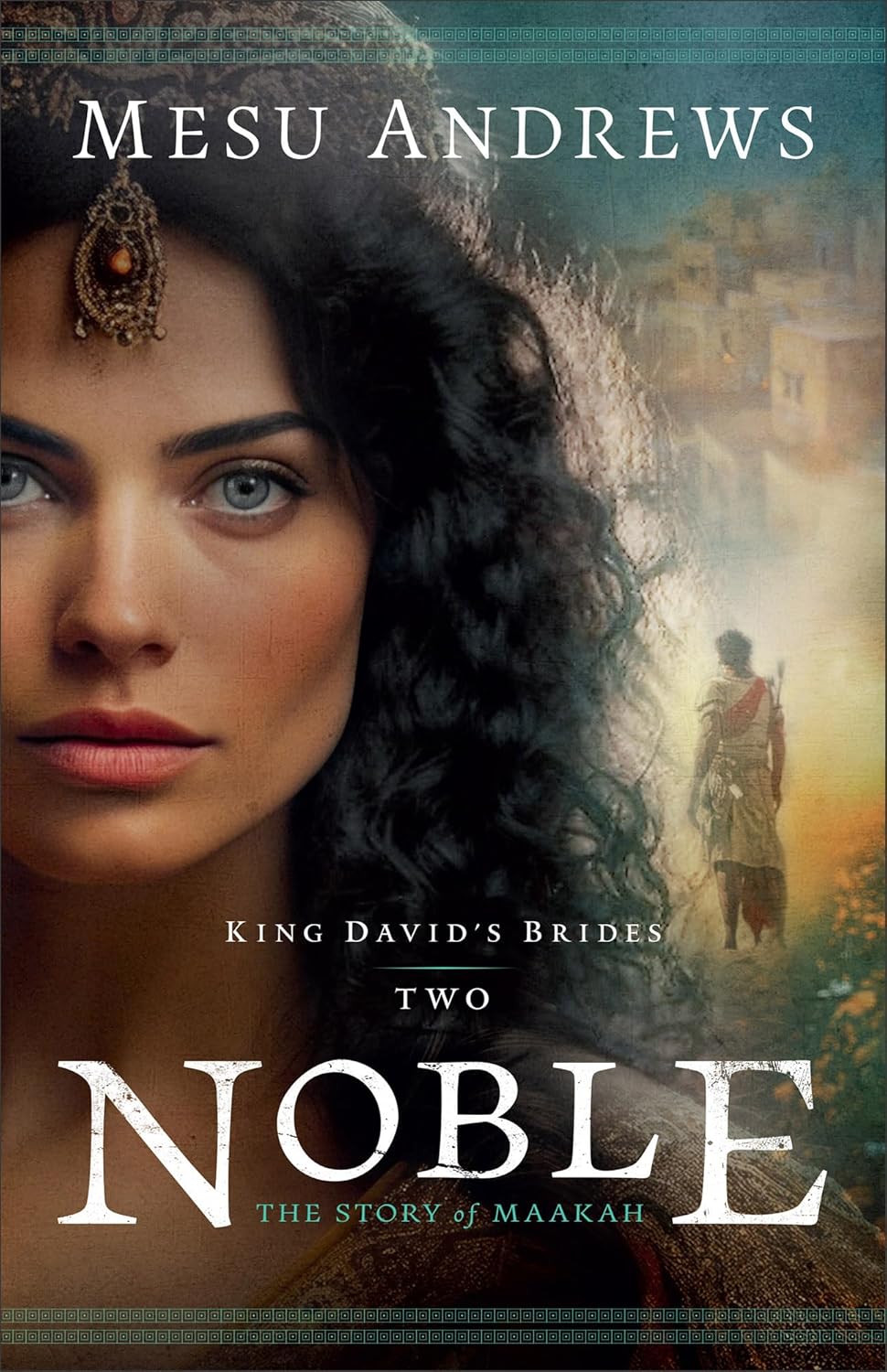
Noble
by Mesu Andrews
ISBN-13: 9780764242625
Paperback: 384 pages
Publisher: Bethany House Publishers
Released: August 19, 2025
Source: ebook review copy from the publisher through NetGalley.
Book Description, Modified from Goodreads:
Princess Maakah of Geshur is duty-bound to create a political alliance for her father through marriage. The cancellation by King Saul of her betrothal to his fourth-born son compels Maakah's father to arrange an unexpected marriage to the rebel David ben Jesse, a shepherd-warrior anointed years earlier as Israel's future king. Maakah obeys her father's wishes out of duty as her nation's only heir. While alliances shift and enemies loom, Maakah navigates the delicate balance between her heritage and her growing respect for David's faith and leadership. In a land torn by war and divided loyalties, she must choose where her allegiance lies.
My Review:
Noble is historical fiction set in ancient Israel. It's the 2nd book in the series, but you can understand this one without reading the previous book. Maakah longs for friendship and a close-knit family, and she thinks she's getting it by marrying David. Both Ahinoam and Abigail, in a vote of no confidence in David and God (and themselves) pushed David to marry Maakah because she could tell him how to be a king. So she tried to advise him (usually with very bad timing and a chunk of arrogance) only for David to repeatedly lose his temper and tell her that only Yahweh could tell him how to be king. But he's enticed by her beauty so can't wait to marry her.
I found David's seduction of Maakah very off-putting. David claimed he's passionately in love with Ahinoam and Abigail, that he'd never break God's law about marrying a foreign wife (especially as Maakah worshiped false gods), and that he wouldn't break God's law about having multiple wives again. After all, he already had three wives, though the author acted like Michal didn't count, though David clearly still considered her his wife in 2 Samuel 3:14. Anyway, before there's an official betrothal, David repeatedly held Maakah in his arms, touched her face, called her "my love" in public, kissed her, and otherwise acted like he had the right to casually invade Maakah's private spaces.
Since King Saul lost God's favor by not obeying God's command and by acting as a priest, it bothered me that David basically acted as a priest--even though he had Abiathar, the High Priest who had the ephod and could enquire of the Lord. The priests taught the Law and interpreted it and led the worship of God, but David fulfilled these roles in this story. Ahinoam asked David how he decided which Laws his people needed to follow, and David basically said he didn't push the ones he thought too hard to follow. David could have asked the High Priest to enquire of the Lord about marrying Maakah. Instead, he decided based off of the fact that he lusted after her and he'd asked God to take away the attraction if he wasn't meant to marry Maakah. Everyone but Joab just accepted David's claim that marrying Maakah was God's will (though Joab approved of the match for political reasons).
Too many things were just improbable. Ahinoam took David's newborn, firstborn son and heir to a forge, apparently making weapons with the baby strapped to her chest. It's hard enough keeping a baby alive without taking them near hammers, hot fires, and pointy objects. Maakah's maid managed to turn 90 of David's followers from Yahweh to worshipping a false goddess in 8 days (as they met David's group when Ahinoam was giving birth and the idolatry was uncovered right after the baby's circumcision). And this was right after God gave David's army a miraculous military victory that everyone witnessed.
And though the author said she stayed true to the Bible account, she didn't always. For example, David stated that only Noah's family survived the global flood...along with supernatural giants, who then turned the surviving humans against God at Babel and who were the giants of David's time. The Bible does not say the giants of David's time were supernatural or decedents of giants from before the Flood nor does it indicate anyone survived the Flood except Noah's family on the Ark.
I also had a hard time accepting the author's portrayal of Uriah as the one leading the discontent against David. In the Bible, he's always portrayed as loyal: Uriah was one of David's most loyal fighters, the Might Men (2 Samuel 23:39). He was allowed to marry Bathsheba, who was the granddaughter of Ahithophel, David’s counselor, and daughter of Eliam, one of his Might Men (2 Samuel 11:3, 2 Samuel 23:34, 2 Samuel 15:12). He acted more honorably than David in 2 Samuel 11. The fictional Uriah is not like the Uriah of the Bible.
There was no sex or bad language.
If you've read this book, what do you think about it? I'd be honored if you wrote your own opinion of the book in the comments.





No comments:
Post a Comment